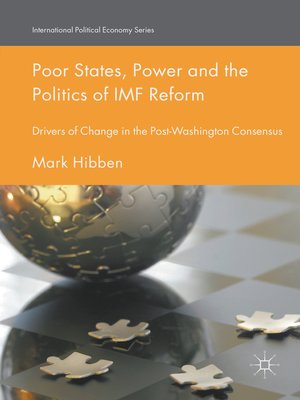Poor States, Power and the Politics of IMF Reform
ebook ∣ Drivers of Change in the Post- Washington Consensus · International Political Economy
By Mark Hibben

Sign up to save your library
With an OverDrive account, you can save your favorite libraries for at-a-glance information about availability. Find out more about OverDrive accounts.
Find this title in Libby, the library reading app by OverDrive.



Search for a digital library with this title
Title found at these libraries:
| Library Name | Distance |
|---|---|
| Loading... |
This books provides a timely comparative case study that reveals the factors driving the International Monetary Fund's policy reform in Low Income Developing Countries (LIDCs), as a resurgent IMF expands its footprint in the world's poorest states. Through a research design that employs both mainstream and critical IPE theory, Mark Hibben uncovers three major tendencies. Principal-agent analysis, he argues, demonstrates that coalition formation among powerful states, IMF staff and management, and other influential actors is necessary for policy reform. At the same time, he uses constructivist analysis to show that ideational frameworks of what merits appropriate macroeconomic policy response also have an impact on reform efforts, and that IMF management and staff seek legitimacy in their policy choices. In response to the crises in 1999 and 2008, the author maintains, poverty and inequality now 'matter' in IMF thinking and serve as an opportunity for policy insiders and external actors to deepen the institution's new commitment to 'inclusive' growth. Finally, Hibben draws on neo-Gramscian analysis to highlight how the IMF looked to soften the destabilizing effects of globalization through reforms focused on stakeholder participation in poor states and will continue to do so in its support of the new United Nation Sustainable Development Goals. This means that the 2015-2030 time period will be a critical juncture for IMF LIDC reform. By drawing from diverse theoretical traditions, the author thus provides a unique framework for the study of contemporary IMF change and how best those interested in LIDC policy reform can meet this objective.







